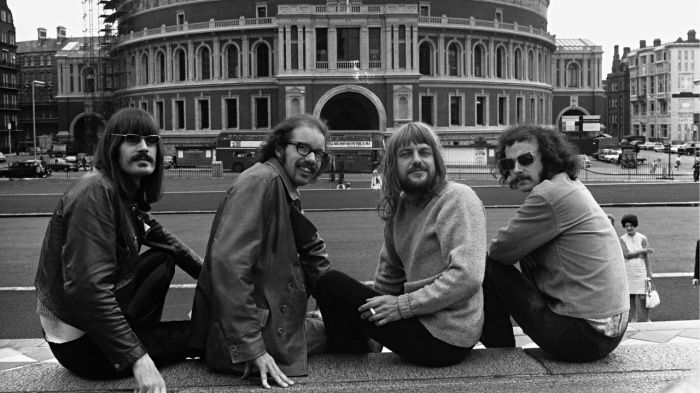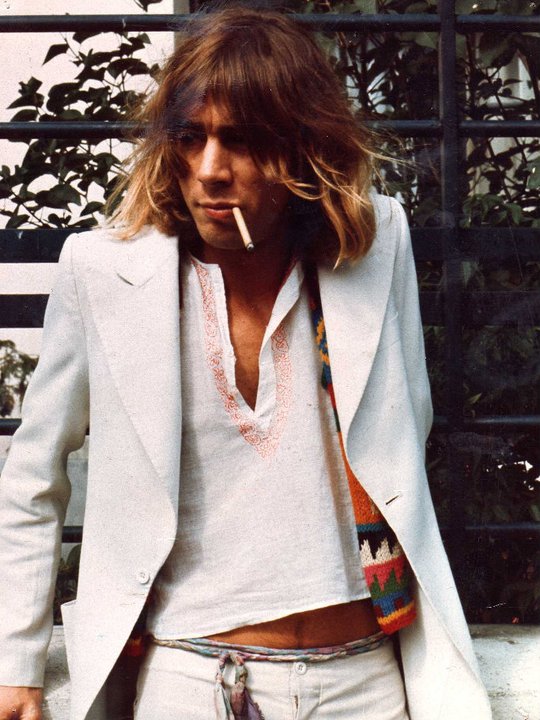Chapter Four - Fourth (1970)

Soft Machine, minus Kevin Ayers, 1970
In early 1970, keyboardist David Bedford recruited the help of Soft Machine (who had dropped the proper article from their name beforehand) to record a piece based on the William Blake poem The Garden of Love. The recording was entirely live, recorded in a single take, and it featured saxophone player Lol Coxhill and guitarist Mike Oldfield, leading to a 8-man lineup, along with a group of “six beautiful girls”.

Album Cover for the 1996 release of Spaced - Cuneiform Records
In April 1970, the band were commissioned by the BBC to write and perform a set of pieces meant to be the soundtrack for the Apollo 13 lunar landing. However due to that mission’s failure, the pieces went unreleased until 1996, under the name Spaced. Following that, the band would spend time recording their next album. The sessions, however, were fraught with tension, in particular between Mike Ratledge and Kevin Ayers.
"I think with the addition of Elton and all them, Soft Machine were going more in the direction of fusion jazz and I didn't like that, neither did Robert if I recall. They were going more in the direction of jazz, which didn't interest us. I was strictly pop. They were into what I consider really to be incredibly self-indulgent music. It's stuff you play for yourself, and 'fuck the audience'...".
Kevin Ayers, 2006
Tensions took a head during a particular session for Robert Wyatt’s composition, Moon in June, in which Ratledge refused to play on the lyrical section of the song, causing Ayers to call out on his attitude. An argument soon broke out, which soon caused Ayers to storm off from the studio. A day later, the group got together for a meeting, yet Ayers was nowhere to be seen. In later interviews, Ayers gave contradictory responses as to where he went. Albeit it is speculated that he most likely went to either Majorca or somewhere in southern France.
"I honestly wish I could say that Kevin's departure was entirely amicable, but I'd be lying."
Mike Ratledge, 1997
Despite this, the band soldiered on without Ayers. In total, they had recorded four tracks for the album, appropriately titled Fourth. However, at the insistence of Harvest, they replaced one (Out Bloody Rageous) of the tracks with The Garden of Love, due to its inclusion of Ayers.

Full Cover

Gatefold
Side A:
Facelift (Live) (18:45) (Hugh Hopper) [1]
Side B:
Slightly All The Time (18:11) (Mike Ratledge) [1]
Side C:
Moon in June (19:08) (Robert Wyatt) [1]
Side D:
The Garden of Love (18:41) (David Bedford, William Blake) [2]
Released: June 6th, 1970
Top position in UK charts: #14
Top position in US charts: #79
Track sources:
[1] - Third, 1970
[2] - The Garden of Love, 1998, Edited
Despite the positive reception, tensions in the band were still high. One of their members was MIA, and there was a clear change in sound that alienated some of their older fans. Despite this, the band continued to soldier forth. In August 1970, the band made history due to being the first rock band invited to play at London’s Proms.

Kevin Ayers, 1970
“I remember a couple of days after the Proms concert, Mike called me up, telling me he felt bad about pushing Kevin away, and talked about it with Hugh and Elton. It also turns out he managed to track Kevin down, they agreed that they had to go their separate ways.”
Robert Wyatt, 2011
“At first, I had offered to leave the band, since I felt like my simplicity didn't fit the band at that time, but Mike ended up insisting on leaving himself. I don’t remember exactly what he said, but I do think he said something about it being ‘mine and Robert’s band’. He, Hugh Elton, and briefly Robert later formed a new band, Tanglewood Tails if I’m not mistaken.”
Kevin Ayers, 1979
By October of 1970, Soft Machine had essentially narrowed down to just Ayers and Wyatt. As such, they decided to put the band on hiatus. The two agreed that they’d been through a lot that year, and needed to take a leap year away from Soft Machine.

Comments
Post a Comment